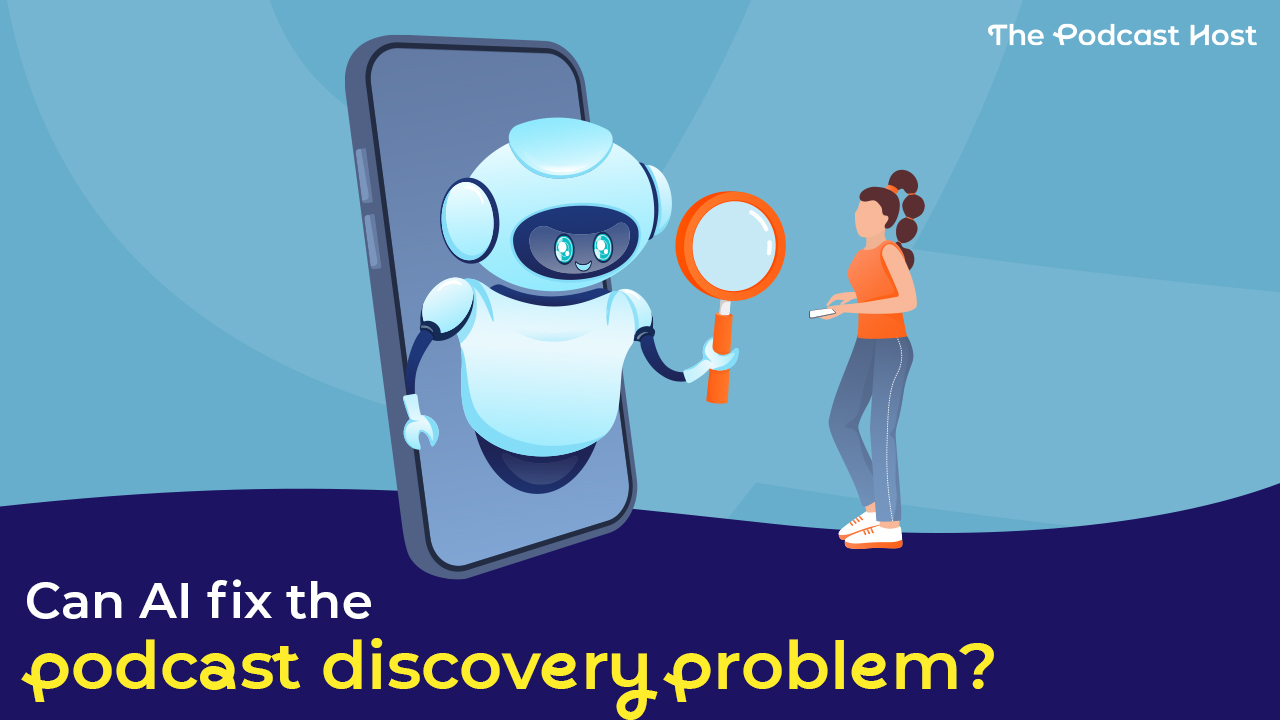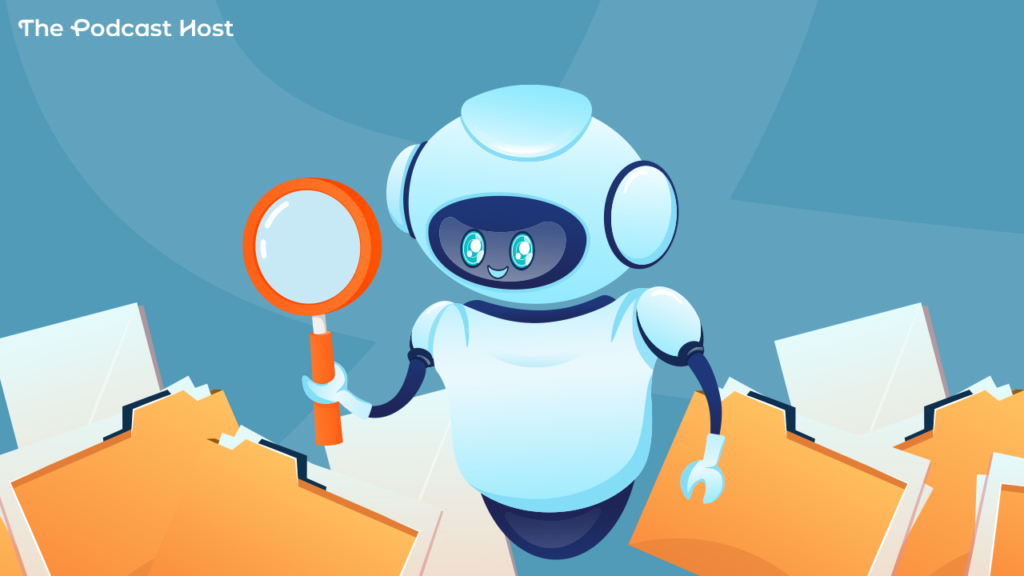Can AI Fix the Podcast Discovery Problem?

In 2023, there are more than 4 million podcasts out there. Whether you’re a listener or a creator (if you’re reading this article, you’re likely both), that’s a pretty overwhelming number.
With so much podcast content out there, finding shows that genuinely align with your interests, values (and are actually good) isn’t so straightforward.
While there are positives around how discovery currently works in podcasting, it’s not perfect. In fact, it’s far from perfect.
But the good news is, artificial intelligence technology is making some big improvements to how listeners find new content that’s actually relevant to them – while retaining a lot of those positives too.
Let’s take a look at how AI is on the way to ‘fixing’ podcasting’s discovery problem, and why this is good news for creators.
The Podcast Discovery Problem
What’s GOOD About Podcast Discovery?
While podcast discovery has its problems, there are a few positive factors worth highlighting about how it works right now – particularly for creators.
The biggest positive is that, unlike other types of content, there’s no single platform that dominates the podcasting space. As this survey we ran with listeners shows, there are so many different ways listeners find new podcasts.
Compare this to music, and you’ll see how huge the contrast is. Platforms like Spotify have become so ingrained in many people’s listening habits that they never leave the platform. It becomes inseparable from their listening. This allows big companies to monopolise how people find music.
Podcasts, on the other hand, can be discovered in as many places as they are found – and beyond. Podcasters have more control over their discoverability than they often think. There are many ways to promote and market content that doesn’t rely on one main company sticking you in a chart or ‘featured’ section.
Discovering new podcasts has also become something of a social thing. 33% of listeners in the same survey told us they find new podcasts by asking friends or other listeners in their online communities for recommendations. And sure, this might be because discoverability is a problem for them, but it’s also because people actually enjoy talking about podcasts with others. There’s something pretty special about that.

What’s BAD About Podcast Discovery?
But while fewer gatekeepers and keeping discovery organic is nice, there’s no denying that better discoverability means better chances of more listeners finding your podcast.
Having one place where listeners can find new podcasts is a nice thought. But the problem is the search functions on some of the leading listening platforms leave a lot of discovery on the table.
Take Overcast, for example. It’s one of the best and most popular podcast listening platforms, but the top-level search feature only scans through podcast and creator names to find matches. The search function doesn’t even stretch to episode level (unless you find a podcast and click through to it). This process is heavily reliant on podcast names being super descriptive for it to be effective.
Apple Podcasts’ search hasn’t been great over the years, either. It only searched podcast names, creator names, and episode titles, but not shownotes or podcast descriptions. It’s hard to gauge for sure whether there’s a bit more at play now, but it does seem to offer a better search experience than Overcast.
That said, Apple’s search rankings are determined by a podcast’s all-time number of followers on the platform. This means newer shows can struggle to appear, especially for competitive keywords.
Apple Podcasts is known for its charts and featured sections, too. These date back to the iTunes desktop app days. Podcasters would obsess over them, but they have always been largely unhelpful for podcast listeners. Charts are either hand-curated (and thus, out of your control) or gameable by podcasters willing to pay for underhand tactics.
Bottom line: if you set out to find a new podcast to listen to, there’s no clear and obvious way to do it. There’s also no guarantee you’ll find what you’re looking for – even if it does exist!
So, if AI is promising brilliant tools and solutions for podcasters in all aspects of their workflow, what will it do to improve podcast discovery?
How AI is Changing Podcast Discovery for the Better
AI technology is already finding its way into most parts of the podcast creation process. Here’s how it’s making waves in podcast discovery too.

Machine Learning is Massively Improving Search Algorithms
The YouTube, Spotify and TikTok algorithms are all AI-powered, and these are the most effective platforms for podcast discovery these days. Gen Z apparently discovers twice as many new podcasts as other generations because they use these platforms.
Many listening platforms have begun using machine learning to assess patterns in listener behaviour to recommend content that’s likely relevant to users. For example, what other podcasts do they subscribe to? Which episodes do they listen to all the way to the end? What do listeners who subscribe to the same podcasts as them also listen to?
By identifying patterns, AI-powered algorithms can recommend shows listeners are more likely to enjoy. And this is not just great for listeners – it helps creators get their content in front of the right people too.
Natural Language Processing (NLP) is Making Discovery More Accurate
NLP is AI-powered technology that can scan through vast amounts of content and ‘understand’ it. This means that, rather than just pulling out like-for-like keywords in podcast titles (which is how the search function currently works for many listening platforms), it can go much deeper.
For example, NLP can scan entire transcripts at an episode level and pull out podcasts with keywords suggesting they’ll discuss similar topics. Some AI tools in the back-ends of listening apps could even auto-transcribe episodes to search those transcriptions without making them publicly available.
Auto-Transcription is Supporting Advance Discovery
Thanks to AI-powered auto-transcription technology, listeners are no longer limited to relying on titles and descriptions to discover new content relevant to their interests.
Tools like PodcastGPT, Steno and Snipd scan through vast amounts of audio content for you, highlighting parts in the conversation that it thinks will interest you. You tell these kinds of tools what (or even who) you’re interested in hearing more about, and it will locate mentions, highlighting the show, episode and even where the relevant discussion occurred in that episode.
This has the potential to bring totally new podcasts to your attention that you likely never would have found otherwise. Several discovery tools like this are emerging right now, so thankfully, the days of relying on keywords in podcast titles to find relevant content will soon be over.
Personalisation Keeps People Listening
AI technology is personalising the discovery process and making content more relevant for every listener. And the most important thing about this is that it keeps people listening.
I’ll admit I’ve gone through periods where I’ve taken a break from podcasts because I’ve run out of shows I want to listen to. When there are more than 4 million podcasts out there, this shouldn’t happen. AI tools that improve discoverability ensure listeners always have a load of great new content waiting for them.
How to Improve Your Podcast’s Discoverability
So now you might be thinking: this is interesting, but what can I do to capitalise on this new AI technology to help more listeners find my podcast?
Well, the answer to this is no different to what it’s always been. All the main podcast promotion tactics still stand.
You just want to make it as easy as possible for listeners to find and share your podcast. Making your show available on as many listening platforms as possible and having a dedicated podcast website (which makes your podcast discoverable outside of listening platforms) will always be key, too.
And as much as podcasters shouldn’t be sitting around waiting on AI to magically double their downloads, it is nice to know that a helping hand is on the way. If you’re already doing your best to create great content and make it discoverable, then this could be the spark that helps your show ignite and reach its full potential.
It looks like we’re entering a new era for podcast discovery, and that can only be a good thing.
